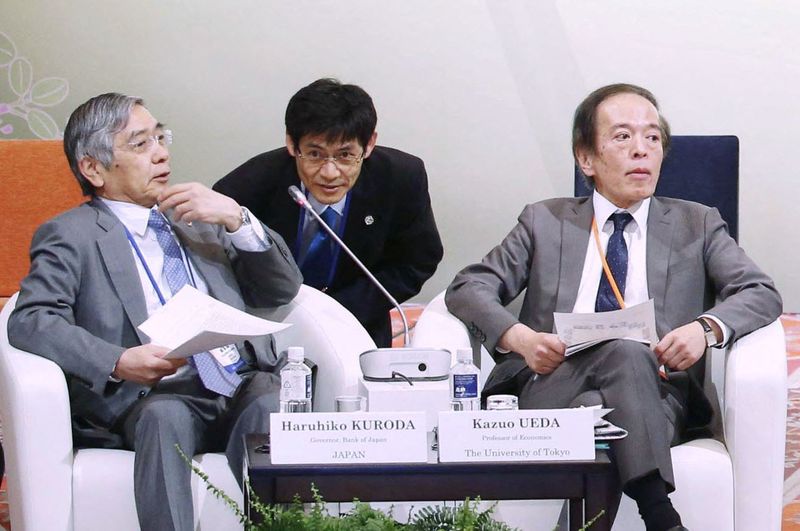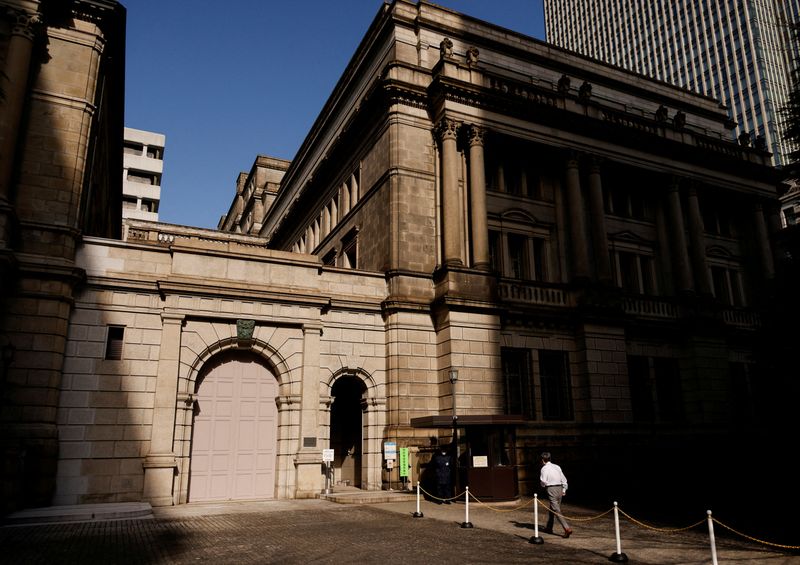By Takaya Yamaguchi, Kentaro Sugiyama and Yoshifumi Takemoto
Tokyo (Reuters) - Japan's government is likely to appoint academic Kazuo Ueda as the next Bank of Japan governor, two government officials told Reuters, a surprise choice that could see the country finally align with other major economies in raising interest rates.
Ueda, a former BOJ policy board member and an academic at Kyoritsu Women's University, is considered an expert on monetary policy but had not even been seen as a dark horse candidate for the top job.
He played a key role in battling the initial phase of Japan's deflation with the introduction of huge amounts of asset purchases and forward guidance for financial markets.
The yen and bond yields initially rose on the news, which fuelled bets the 71-year-old could end super-low interest rates sooner than if top contender and dovish BOJ Deputy Governor Masayoshi Amamiya had got the job.
The Japanese currency trimmed gains after Ueda, in comments streamed online by Nippon TV, said it was appropriate for the BOJ to maintain its current ultra-easy policy. He said nothing had been decided about his nomination.
Investors have repeatedly tried to push up Japanese government bond yields in recent months on expectations the BOJ will start to gradually phase out its massive stimulus programme when a new governor takes over from Haruhiko Kuroda, whose second term ends in April.
Years of heavy BOJ bond buying have increasingly distorted the country's bond markets and many market watchers had thought further tweaks in policy were inevitable.
GRAPHIC: The BOJ’s YCC faces a reckoning (https://www.reuters.com/graphics/JAPAN-ECONOMY/BOJ/zjvqjwdaqpx/chart.jpg)
"Kuroda's policies will be modified and monetary policy will head toward normalisation. But any step will be taken cautiously to avoid any adverse effect on markets and financial institutions," said former BOJ board member Takahide Kiuchi.
BOJ watchers and people who worked with Ueda describe him as a pragmatist who is neither an explicit hawk nor a dove and is well-respected within the central bank.
"Ueda won't make any abrupt, hasty moves toward policy normalisation. But he won't leave the side-effects of the BOJ's policy, such as dysfunctions seen in the bond market, unattended," said Nobuyasu Atago, a former BOJ official who has worked with Ueda.
"I expect the BOJ to gradually phase out YCC this year," he said, referring to the bank's bond yield curve control policy aimed at suppressing short- to medium-term bond yields without depressing super-long yields too much.
BOJ STICKS TO LOOSE POLICY
While central banks around the world have been scrambling to cool stubbornly high inflation with rate hikes, the BOJ has been in no rush to change its super-loose policy stance on the view that wage hikes must accompany recent cost-driven inflation.
Even as Japanese inflation hit 4% in December - double the BOJ's 2% target - Kuroda has argued it is too early to tell if price rises will be sustainable.
The government will also nominate Ryozo Himino, former head of Japan's banking watchdog, and BOJ executive Shinichi Uchida as deputy governors, the two officials with knowledge of the matter said, speaking on condition of anonymity as they were not authorised to speak publicly.
The Nikkei reported earlier that Ueda, Himino and Uchida will make up the new BOJ leadership if confirmed by parliament.
Analysts expect career central banker Uchida to work closely with Ueda, who will be the first academic to take the BOJ helm, and assist him on the operational details of YCC.
Himino, who speaks fluent English, is likely to mainly be in charge of international affairs, they say.
Many central bank watchers had seen Amamiya as the strongest candidate to take the helm given his deep experience in monetary policy, but the Nikkei reported that he had declined.
The yen strengthened after the Nikkei reported the appointments, before trimming some of its gains. The dollar briefly fell 1.2% to 129.8 yen. It was last down 0.5% to 130.90 yen.
Japan's 10-year government bond yield hit 0.50%, the top end of the BOJ's policy band.
Prime Minister Fumio Kishida said on Friday the government is expected to present the nominees to parliament on Feb. 14.
"Being a theorist and practitioner at the same time would make (Ueda) well-positioned going forward as the BOJ enters a difficult period of (policy) normalization," said Shotaro Kugo, an economist at Daiwa Institute of Research.
"None of the three governor/deputy governors appear to have the (dovish) reflationist idea. I can see the government's intention to renew the direction of monetary policy from the previous one."
In an opinion piece in the Nikkei last July, Ueda warned against prematurely raising rates just because inflation briefly exceeded 2%.

But he also wrote that the BOJ must consider how to exit its ultra-loose policy and review its extraordinary stimulus programme at some point.
Ueda served on the BOJ's board from 1998 to 2005. He voted against raising interest rates to 0.25% from zero in August 2000, arguing that the bank could wait a while given limited inflation. The BOJ later reversed its decision and cut rates again.
